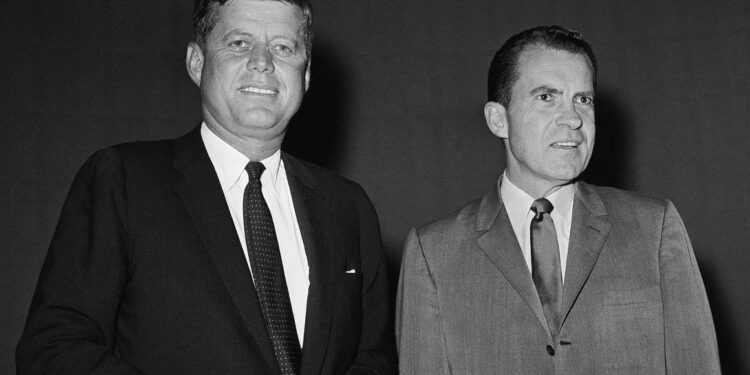John F. Kennedy and Richard Nixon were two pivotal figures in American politics, each leaving a distinctive mark on the nation during a transformative period in its history.
John F. Kennedy, the 35th President of the United States, brought charisma and vigor to the White House. Elected in 1960, he represented a new generation of leadership. His inaugural address, with the famous line “Ask not what your country can do for you; ask what you can do for your country,” captured the spirit of his presidency. Kennedy’s leadership was marked by the Cuban Missile Crisis, where his deft handling of the situation averted a potential nuclear war, showcasing his cool-headedness under pressure.
Nixon, on the other hand, was the 37th President, serving from 1969 to 1974. He was known for his experience and foreign policy expertise, having served as Vice President under Eisenhower. His presidency included monumental achievements like opening diplomatic relations with China, but it was marred by the Watergate scandal, which ultimately led to his resignation in 1974. The Watergate scandal eroded trust in government and intensified public cynicism, overshadowing his policy successes.
The two leaders differed greatly in their leadership styles. Kennedy was celebrated for his oratory skills and his ability to inspire, while Nixon was known for his shrewd political acumen and strategic thinking. Kennedy was a symbol of hope and a unifying force during a turbulent era, while Nixon’s presidency was marked by a more divisive atmosphere.
Kennedy’s tragically short-lived presidency ended with his assassination in 1963, leaving an enduring legacy as a symbol of optimism and idealism. Nixon’s resignation in disgrace marked the end of his political career but also a transformation in American politics, as it ushered in a period of greater scrutiny of the presidency and government institutions.
In retrospect, both Kennedy and Nixon played pivotal roles in shaping modern America. Kennedy’s idealism and charisma continue to resonate with the public, while Nixon’s presidency serves as a cautionary tale about the consequences of unchecked power. These two leaders, in their own distinct ways, reflect the complex and multifaceted nature of American politics and its enduring capacity for change and renewal.
newshub



Recent Comments